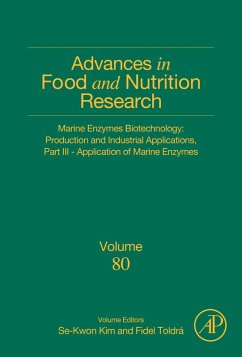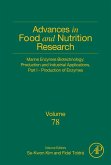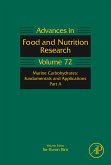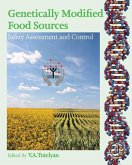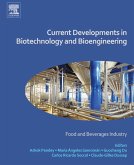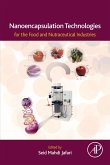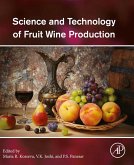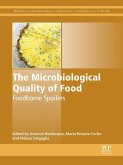Marine Enzymes Biotechnology: Production and Industrial Applications, Part III - Application of Marine Enzymes (eBook, ePUB)
111,95 €
111,95 €
inkl. MwSt.
Sofort per Download lieferbar

56 °P sammeln
111,95 €
Als Download kaufen

111,95 €
inkl. MwSt.
Sofort per Download lieferbar

56 °P sammeln
Jetzt verschenken
Alle Infos zum eBook verschenken
111,95 €
inkl. MwSt.
Sofort per Download lieferbar
Alle Infos zum eBook verschenken

56 °P sammeln
Marine Enzymes Biotechnology: Production and Industrial Applications, Part III - Application of Marine Enzymes (eBook, ePUB)
- Format: ePub
- Merkliste
- Auf die Merkliste
- Bewerten Bewerten
- Teilen
- Produkt teilen
- Produkterinnerung
- Produkterinnerung

Bitte loggen Sie sich zunächst in Ihr Kundenkonto ein oder registrieren Sie sich bei
bücher.de, um das eBook-Abo tolino select nutzen zu können.
Hier können Sie sich einloggen
Hier können Sie sich einloggen
Sie sind bereits eingeloggt. Klicken Sie auf 2. tolino select Abo, um fortzufahren.

Bitte loggen Sie sich zunächst in Ihr Kundenkonto ein oder registrieren Sie sich bei bücher.de, um das eBook-Abo tolino select nutzen zu können.
Approx.216 pagesApprox.216 pages
- Geräte: eReader
- ohne Kopierschutz
- eBook Hilfe
Andere Kunden interessierten sich auch für
![Marine Enzymes Biotechnology: Production and Industrial Applications, Part I - Production of Enzymes (eBook, ePUB) Marine Enzymes Biotechnology: Production and Industrial Applications, Part I - Production of Enzymes (eBook, ePUB)]() Marine Enzymes Biotechnology: Production and Industrial Applications, Part I - Production of Enzymes (eBook, ePUB)111,95 €
Marine Enzymes Biotechnology: Production and Industrial Applications, Part I - Production of Enzymes (eBook, ePUB)111,95 €![Marine Carbohydrates: Fundamentals and Applications, Part A (eBook, ePUB) Marine Carbohydrates: Fundamentals and Applications, Part A (eBook, ePUB)]() Marine Carbohydrates: Fundamentals and Applications, Part A (eBook, ePUB)117,95 €
Marine Carbohydrates: Fundamentals and Applications, Part A (eBook, ePUB)117,95 €![Genetically Modified Food Sources (eBook, ePUB) Genetically Modified Food Sources (eBook, ePUB)]() Genetically Modified Food Sources (eBook, ePUB)68,95 €
Genetically Modified Food Sources (eBook, ePUB)68,95 €![Current Developments in Biotechnology and Bioengineering (eBook, ePUB) Current Developments in Biotechnology and Bioengineering (eBook, ePUB)]() Current Developments in Biotechnology and Bioengineering (eBook, ePUB)120,95 €
Current Developments in Biotechnology and Bioengineering (eBook, ePUB)120,95 €![Nanoencapsulation Technologies for the Food and Nutraceutical Industries (eBook, ePUB) Nanoencapsulation Technologies for the Food and Nutraceutical Industries (eBook, ePUB)]() Nanoencapsulation Technologies for the Food and Nutraceutical Industries (eBook, ePUB)104,95 €
Nanoencapsulation Technologies for the Food and Nutraceutical Industries (eBook, ePUB)104,95 €![Science and Technology of Fruit Wine Production (eBook, ePUB) Science and Technology of Fruit Wine Production (eBook, ePUB)]() Science and Technology of Fruit Wine Production (eBook, ePUB)65,95 €
Science and Technology of Fruit Wine Production (eBook, ePUB)65,95 €![The Microbiological Quality of Food (eBook, ePUB) The Microbiological Quality of Food (eBook, ePUB)]() The Microbiological Quality of Food (eBook, ePUB)131,95 €
The Microbiological Quality of Food (eBook, ePUB)131,95 €-
-
-
Approx.216 pagesApprox.216 pages
Dieser Download kann aus rechtlichen Gründen nur mit Rechnungsadresse in A, B, BG, CY, CZ, D, DK, EW, E, FIN, F, GR, HR, H, IRL, I, LT, L, LR, M, NL, PL, P, R, S, SLO, SK ausgeliefert werden.
Produktdetails
- Produktdetails
- Verlag: Elsevier Science & Techn.
- Seitenzahl: 228
- Erscheinungstermin: 17. Februar 2017
- Englisch
- ISBN-13: 9780128097281
- Artikelnr.: 47663887
- Verlag: Elsevier Science & Techn.
- Seitenzahl: 228
- Erscheinungstermin: 17. Februar 2017
- Englisch
- ISBN-13: 9780128097281
- Artikelnr.: 47663887
- Herstellerkennzeichnung Die Herstellerinformationen sind derzeit nicht verfügbar.
Professor Fidel Toldrá is Research Professor at the Instituto de Agrpquimica y Tecnologia de Alimentos, CSIC in Valencia (Spain) where he leaders the group on Protein Foods. He was a Fulbright postdoctoral scholar at Purdue University (West Lafayette, Indiana, 1985-86) and visiting scientist at the University of Wisconsin (Madison, Wisconsin, 1991 and 1995), and the Institute of Food Research (Bristol, UK, 1987). He is Editor-in-Chief of Trends in Food Science & Technology, Associate Editor of Meat Science and Editor of book serial Advances in Food and Nutrition Research. He has published >365 manuscripts, with h index 74, and has filed 11 patents. He is a member of the Editorial Board of 16 scientific journals including Food Chemistry, Current Opinion in Food Science, Journal of Food Engineering, Food Analytical Methods, International Journal of Molecular Sciences, and Food Science & Human Wellness, among other. He is author of 2 books, 163 book chapters, and edited 63 books, being Editor of the 8th and 9th editions of Lawrie´s Meat Science book (Elsevier) and an Editor-in-Chief of the Encyclopedia of Food and Health (2015, Academic Press/Elsevier). He received the 2001 Institute Danone Award to the best Scientific Trajectory, 2002 International Prize for Meat Science and Technology, 2010 Distinguished Research Award, 2014 Meat Processing Award and 2023 International Lectureship Award, all 3 from the American Meat Science Association, 2015 Dupont Science Award, 2019 Innovation Award of the Spanish Association of Meat Industry and 2019 Award on Advancement of Agricultural and Food Chemistry of the American Chemical Society (ACS). He is a Fellow of the International Academy of Food Science and Technology (IAFOST), Fellow of the Institute of Food Technologists (IFT), Fellow of the Agricultural and Food Chemistry Division of the American Chemical Society and Fellow of the International Association of Advanced Materials. Prof. Toldrá served at Panels on Food A
dditives and on Flavorings, Enzymes, Processing aids and Food contact materials of the European Food Safety Authority (EFSA, 2003-15) and was Chairman of the Working groups on Irradiation (2009-10), Processing Aids (2011-14) and Enzymes (2010-15). In 2008-09 he joined the FAO/WHO group of experts to evaluate chlorine-based disinfectants in the processing of foods.
dditives and on Flavorings, Enzymes, Processing aids and Food contact materials of the European Food Safety Authority (EFSA, 2003-15) and was Chairman of the Working groups on Irradiation (2009-10), Processing Aids (2011-14) and Enzymes (2010-15). In 2008-09 he joined the FAO/WHO group of experts to evaluate chlorine-based disinfectants in the processing of foods.
1. Marine Enzymes in Cancer: A New Paradigm
2. Bacillus Probiotic Enzymes: External Auxiliary Apparatus to Avoid Digestive Deficiencies, Water Pollution, Diseases, and Economic Problems in Marine Cultivated Animals
3. Characterization and Applications of Marine Microbial Enzymes in Biotechnology and Probiotics for Animal Health
4. Biotechnological Applications of Marine Enzymes From Algae, Bacteria, Fungi, and Sponges
5. Biomedical Applications of Enzymes From Marine Actinobacteria
6. Production of Enzymes From Agricultural Wastes and Their Potential Industrial Applications
7. Marine Enzymes: Production and Applications for Human Health
8. Bioremediation of Industrial Waste Through Enzyme Producing Marine Microorganisms
9. Marine Enzymes and Microorganisms for Bioethanol Production
10. Enzymes in Fermented Fish
2. Bacillus Probiotic Enzymes: External Auxiliary Apparatus to Avoid Digestive Deficiencies, Water Pollution, Diseases, and Economic Problems in Marine Cultivated Animals
3. Characterization and Applications of Marine Microbial Enzymes in Biotechnology and Probiotics for Animal Health
4. Biotechnological Applications of Marine Enzymes From Algae, Bacteria, Fungi, and Sponges
5. Biomedical Applications of Enzymes From Marine Actinobacteria
6. Production of Enzymes From Agricultural Wastes and Their Potential Industrial Applications
7. Marine Enzymes: Production and Applications for Human Health
8. Bioremediation of Industrial Waste Through Enzyme Producing Marine Microorganisms
9. Marine Enzymes and Microorganisms for Bioethanol Production
10. Enzymes in Fermented Fish
1. Marine Enzymes in Cancer: A New Paradigm
2. Bacillus Probiotic Enzymes: External Auxiliary Apparatus to Avoid Digestive Deficiencies, Water Pollution, Diseases, and Economic Problems in Marine Cultivated Animals
3. Characterization and Applications of Marine Microbial Enzymes in Biotechnology and Probiotics for Animal Health
4. Biotechnological Applications of Marine Enzymes From Algae, Bacteria, Fungi, and Sponges
5. Biomedical Applications of Enzymes From Marine Actinobacteria
6. Production of Enzymes From Agricultural Wastes and Their Potential Industrial Applications
7. Marine Enzymes: Production and Applications for Human Health
8. Bioremediation of Industrial Waste Through Enzyme Producing Marine Microorganisms
9. Marine Enzymes and Microorganisms for Bioethanol Production
10. Enzymes in Fermented Fish
2. Bacillus Probiotic Enzymes: External Auxiliary Apparatus to Avoid Digestive Deficiencies, Water Pollution, Diseases, and Economic Problems in Marine Cultivated Animals
3. Characterization and Applications of Marine Microbial Enzymes in Biotechnology and Probiotics for Animal Health
4. Biotechnological Applications of Marine Enzymes From Algae, Bacteria, Fungi, and Sponges
5. Biomedical Applications of Enzymes From Marine Actinobacteria
6. Production of Enzymes From Agricultural Wastes and Their Potential Industrial Applications
7. Marine Enzymes: Production and Applications for Human Health
8. Bioremediation of Industrial Waste Through Enzyme Producing Marine Microorganisms
9. Marine Enzymes and Microorganisms for Bioethanol Production
10. Enzymes in Fermented Fish
